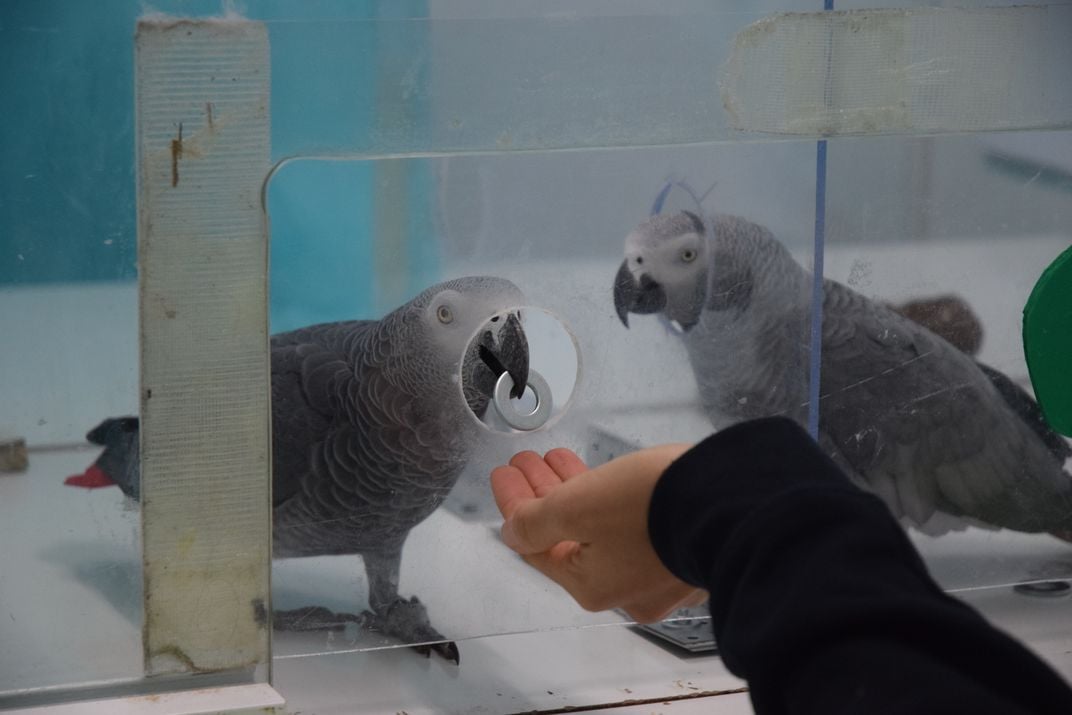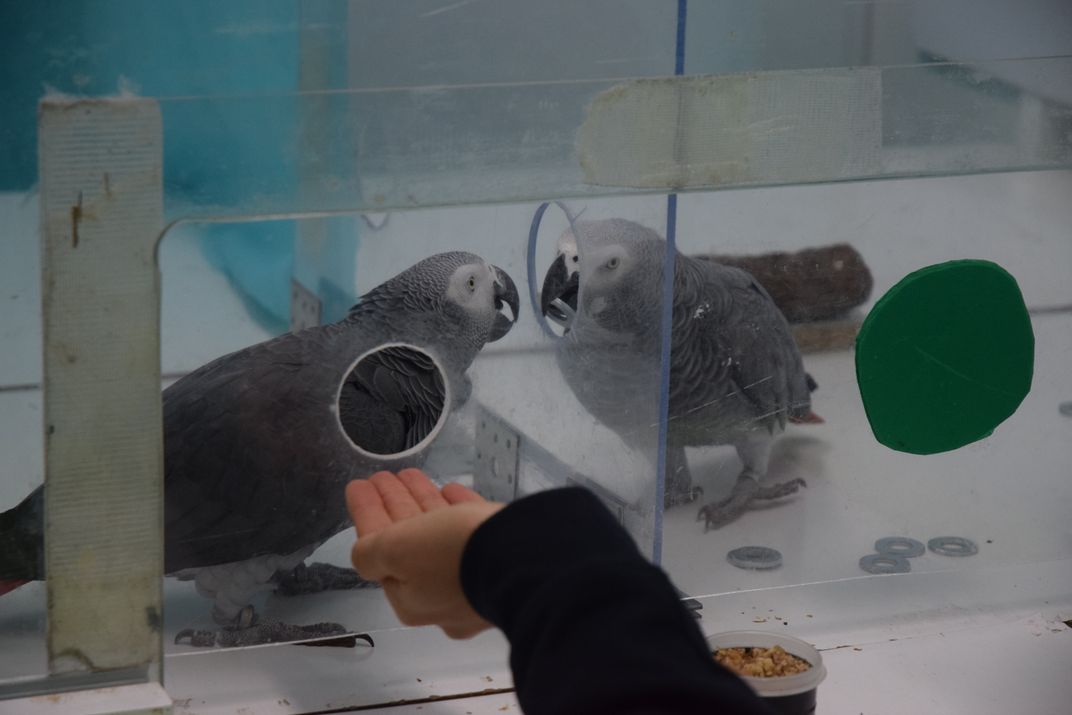Parrots Will Share Currency to Help Their Pals Purchase Food
Animals often share food, but these birds understand that metal rings can be exchanged for treats, and they share the rings with no promise of reward
/https://tf-cmsv2-smithsonianmag-media.s3.amazonaws.com/filer/76/ca/76cac886-dc9e-4951-9e95-ac5c8cc475ad/7139212965_d09ff0967d_o.png)
Parrots go bonkers for walnuts.
After snatching the seeds, these brightly plumed birds crack into them with glee. When offered the nuts as a prize, parrots will do tricks, solve puzzles and learn complex tasks. They’ll even trade currency for them in the form of small metal rings passed into the hands of human researchers.
“They all really like the walnuts,” says Désirée Brucks, an animal behaviorist at ETH Zürich in Switzerland. “They don’t get them in their normal diet, so it’s quite a good reward.”
But despite the nuts’ value—or perhaps because of it—parrots are also willing to share their treats and the tokens to buy them with other birds. Given the option, the birds will transfer the precious metal rings to a friend in a neighboring cage so they, too, can enjoy some nutty nosh—even without the promise of reciprocation, Brucks’ latest research shows.

The birds’ generosity has animal scientists intrigued. It’s one thing to pass a partner a piece of grub; it’s another to give them the currency to purchase it. Such acts of charity have long been thought to be restricted to primates like humans, orangutans and bonobos. Few, if any, other mammals were thought capable of it, let alone a creature with a bird brain.
But big-brained African grey parrots (Psittacus erithacus) may be the first avian known to engage in this helpful behavior, Brucks’ team reports today in the journal Current Biology. Parrots, it seems, don’t just have the ability to comprehend metal rings as currency for food, but they also “understand the consequences their actions can have on another individual,” says Christina Riehl, an expert in bird behavior at Princeton University who wasn’t involved in the research. “That’s pretty sophisticated reasoning.”
In research labs and wild habitats alike, plenty of animals have been observed gifting their friends with grub. Bonobos pass morsels of meat to strangers, vampire bats barf blood into hungry relatives’ mouths, and canines will tap their snouts to touch screens to share sausages with packmates.
But Brucks and Auguste von Bayern, an animal behaviorist at the Max Planck Institute for Ornithology in Germany, wanted to test the limits of this generosity in parrots, long considered to be among the brainiest of birds. So they set up an experiment that involved the transfer of treats—with a bit of extra mental gymnastics mixed in.
After training eight African grey parrots and six blue-headed macaws to barter metal rings for walnuts, the researchers paired the birds up with same-species partners. They then put the parrots in clear chambers joined by a transfer hole, and gave one bird—the donor—ten rings, while the other was left with none.
Even without the promise of a reward for themselves, seven out of eight of the African grey parrot donors passed some of their available tokens through the transfer hole to their broke partners, usually shuttling them beak to beak. On average, about half the metal rings made it through, allowing the recipients to trade the trinkets for walnuts through another window.
“It was amazing to see,” Brucks says. “I thought that when they saw they weren’t gaining anything, they’d stop. But they just kept doing it … some transferred [all] ten of their tokens.”
The blue-headed macaws, however, weren’t as philanthropic, keeping almost 90 percent of their metal rings to themselves. And when they did transfer tokens, the acts were mostly passive: They simply dropped the currency onto the floor of their partner’s enclosures.
The macaw behavior wasn’t necessarily selfish, however. During these trials, none of the walnut exchange holes on the donor side were open, so the birds weren’t explicitly hoarding snacks for themselves. But unlike the African greys, the macaws didn’t appear to have any spontaneous inclination to lend a helping wing, Brucks says.
The parrots eventually swapped roles, giving recipients the chance to pay their donors back. But none of the birds started the task with this knowledge. And when the researchers repeated the experiment, this time blocking the recipients from exchanging their tokens so neither bird could buy walnuts, the African grey donors took note—and transferred far fewer rings.
“Anytime birds undergo a lot of training … behaviors like transferring tokens can become automatic,” says Jennifer Vonk, a cognitive psychologist at Oakland University who wasn’t involved in the study. “But these parrots could differentiate. They only transferred tokens when it was actually useful for [their partners].” That discrepancy, she says, hints that the parrots aren’t just capable of sharing—they understand why they’re doing it.

But even the most charitable African greys didn’t transfer tokens willy-nilly. The stronger the social bond they shared with their partners—some of whom were directly related to the donors—the more rings passed from chamber to chamber. Because of these preferences, the team’s results can’t be generalized to all kinds of parrot partnerships, or to wild populations, says Irene Pepperberg, an animal cognition expert who studies African grey parrots at Harvard University but wasn’t involved in the study. How this behavior might benefit birds in more natural environments is also up for debate. The forests of Africa, where these birds are found, aren’t exactly teeming with walnut markets that deal in metal rings.
The experiments also didn’t test what parrots would do in a more costly situation, Riehl points out. If, for instance, the donor birds’ own walnut exchange holes had been open, they might have been more hesitant to give up their tokens.
Still, understanding how members of other species respond to friends in need is an important pursuit, Pepperberg says. Her own research with these birds has shown time and time again that African greys aren’t shy about sharing and have clever ways of doing it. In the wild, these parrots live in large, haphazard groups, where building up a reputation for generosity could give individual birds a leg up, Vonk says.
Whether other birds, including the nearly 400 other parrot species around the globe, exhibit these behaviors remains to be seen. Somewhat surprisingly, one team of researchers found that, in a similar experiment, ravens, another exceptionally bright bird, don’t exhibit the same tendency to share, Brucks says. Neither, it seems, do chimpanzees or gorillas.
African grey parrots have shown that cleverness and complex behavior are present in many branches of the tree of life. “Birds are still often thought of as much less ‘advanced’ than mammals, especially primates,” Riehl says. “But they have a lot of regard for each other … and they can form these bonds with humans, too. It’s why they make such great pets.”
/https://tf-cmsv2-smithsonianmag-media.s3.amazonaws.com/accounts/headshot/10172852_10152012979290896_320129237_n.jpg)


/https://tf-cmsv2-smithsonianmag-media.s3.amazonaws.com/accounts/headshot/10172852_10152012979290896_320129237_n.jpg)